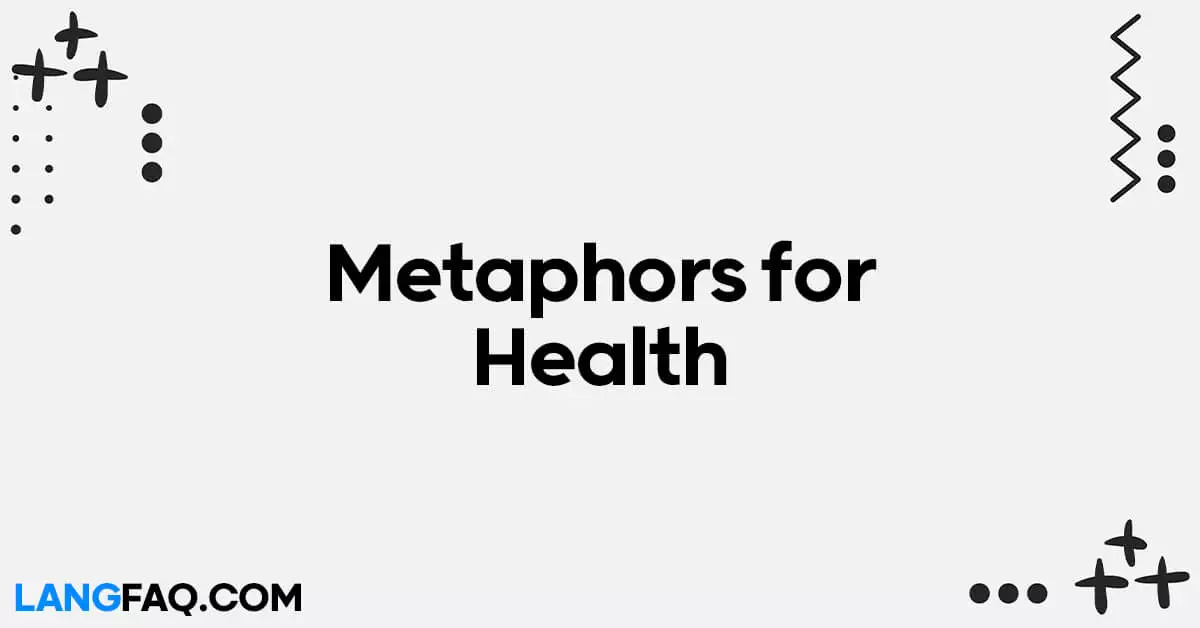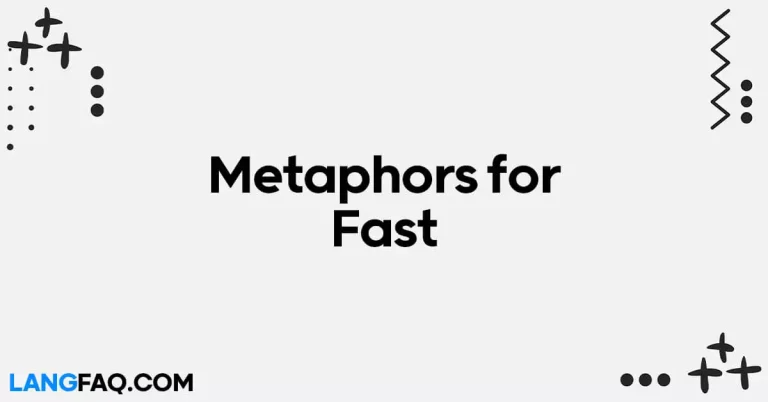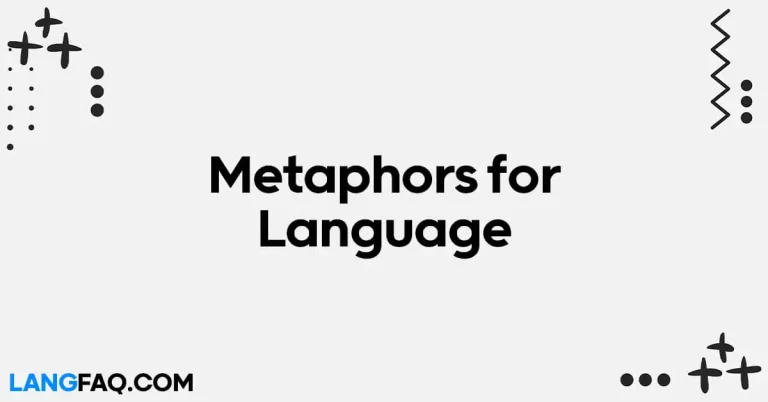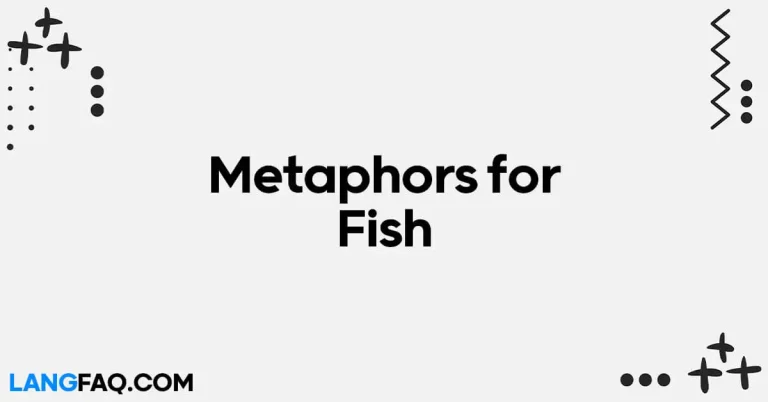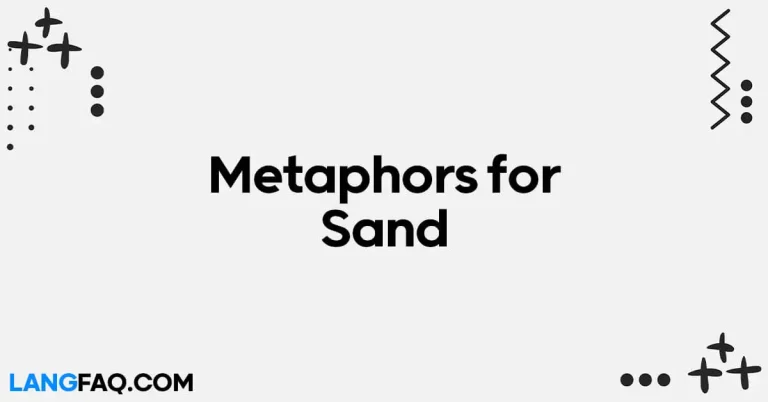Metaphors, the poetic language of everyday life, play a profound role in shaping our understanding of complex topics, including health. In this article, we’ll embark on a journey through 26 metaphors that illuminate the secrets to well-being. As we explore each metaphor, you’ll gain insights into the rich tapestry of ideas surrounding mental, physical, and emotional health.
26 Metaphors for Health
- Well-being is a Garden: Just as a garden requires care, attention, and nourishment, so does our health. Regular care and positive habits cultivate a flourishing state of well-being.
- Life’s Journey as a Health Odyssey: Viewing life as a journey, health becomes the ongoing adventure with its ups and downs, detours, and scenic views.
- Health as a Balancing Act: Just like a tightrope walker maintaining balance, our well-being thrives when we find equilibrium between work, play, and self-care.
- Resilience is a Phoenix: Resilience in health is akin to the mythical phoenix rising from adversity, emerging stronger and renewed.
- The Body as a Temple: Treating our bodies with respect and care, akin to cherishing a sacred temple, is crucial for maintaining good health.
- Optimism as Sunshine: Positivity acts as the sunshine that brightens our mental and emotional landscape, fostering growth and warmth.
- Emotions as Waves: Emotions, like waves, ebb and flow. Acknowledging and riding these waves is essential for maintaining emotional health.
- Mind-Body Connection as Harmony: The intricate connection between mind and body resembles the harmonious interplay of musical instruments in an orchestra.
- Healthy Lifestyle as a Symphony: Adopting a healthy lifestyle is akin to orchestrating a symphony of good habits, each contributing to the overall wellness melody.
- Preventive Health as a Shield: Engaging in preventive health measures creates a protective shield, guarding against potential illnesses and challenges.
- Mental Clarity as a Clear Sky: A mind free from clutter and stress is like a clear sky, allowing for optimal mental well-being.
- Holistic Health as a Puzzle: Holistic health involves assembling the pieces of physical, mental, and emotional well-being into a complete and harmonious picture.
- Family Support as a Safety Net: Families act as a safety net, providing support and comfort during times of health challenges.
- Community Health as a Ripple Effect: Individual health choices create ripples that extend to the wider community, emphasizing shared responsibility for well-being.
- Overcoming Challenges as Climbing Mountains: Facing health challenges is comparable to summiting a mountain – requiring determination, effort, and resilience.
- Self-Empowerment as a Beacon: Empowering oneself in health is like becoming a guiding beacon, leading the way to personal growth and well-being.
- Stress as a Heavy Burden: Stress, when viewed as a heavy burden, underscores the importance of finding metaphorical strategies to lighten the load.
- Healing as a Blooming Flower: Healing is a gradual process, akin to a flower blooming—one petal at a time—revealing renewed strength and vitality.
- Metaphors as Mirrors: Metaphors serve as mirrors, reflecting our inner health landscape and facilitating self-reflection and understanding.
- Positive Thinking as a Ray of Light: Cultivating positive thinking is like inviting a ray of light into our mental and emotional spaces, dispelling darkness.
- Cultural Perspectives as Diverse Colors: Cultural metaphors add diverse colors to the canvas of health, enriching our understanding of well-being.
- Empathy as a Healing Balm: Practicing empathy in health becomes a soothing balm, fostering connection and understanding.
- Science and Metaphor as Bridges: Metaphors in scientific contexts act as bridges, connecting complex concepts with everyday understanding.
- Personal Growth as a Blooming Tree: Pursuing health is comparable to the growth of a tree, branching out in various dimensions of well-being.
- Communication as a Health Compass: Clear and effective communication about health serves as a compass, guiding individuals on their wellness journey.
- Health as a Story: Our health is a continuous narrative, with each choice, challenge, and triumph contributing to the unfolding story of well-being.
| Metaphor | Meaning and Interpretation | Example |
|---|---|---|
| Well-being is a Garden | Taking care of one’s health requires nurturing, attention, and positive habits. | Cultivating good habits is like tending to a garden; it leads to a flourishing well-being. |
| Life’s Journey as a Health Odyssey | Viewing life as a continuous journey where health is an ongoing adventure. | Embracing the health journey is akin to navigating the twists and turns of life. |
| Health as a Balancing Act | Maintaining equilibrium between work, play, and self-care for overall well-being. | Balancing life’s demands is like walking a tightrope, requiring careful equilibrium. |
| Resilience is a Phoenix | Resilience in health is the ability to rise stronger from challenges and adversity. | Just as a phoenix emerges anew, resilience allows us to bounce back from health setbacks. |
| The Body as a Temple | Treating the body with respect and care, akin to cherishing a sacred temple. | Honoring our bodies is essential; they are the temples that house our well-being. |
| Optimism as Sunshine | Positivity brightens the mental and emotional landscape, fostering growth and warmth. | A positive mindset is like sunshine, bringing brightness and warmth to our well-being. |
| Emotions as Waves | Emotions, like waves, ebb and flow, requiring acknowledgment and understanding. | Navigating emotions is like riding waves, embracing the natural ebb and flow of feelings. |
| Mind-Body Connection as Harmony | The intricate connection between mind and body resembles harmonious musical interplay. | Achieving harmony between mind and body is like orchestrating a beautiful musical composition. |
| Healthy Lifestyle as a Symphony | Adopting a healthy lifestyle involves orchestrating a symphony of good habits. | Living healthily is akin to conducting a symphony, each habit contributing to the overall melody. |
| Preventive Health as a Shield | Engaging in preventive health measures creates a protective shield against potential illnesses. | Preventive health acts as a shield, guarding us against the onset of various health challenges. |
| Mental Clarity as a Clear Sky | A mind free from clutter and stress is like a clear sky, allowing for optimal mental well-being. | Achieving mental clarity is akin to clearing the sky, allowing thoughts to flow freely. |
| Holistic Health as a Puzzle | Holistic health involves assembling the pieces of physical, mental, and emotional well-being. | Holistic health is like completing a puzzle, with each aspect contributing to the overall picture. |
| Family Support as a Safety Net | Families provide a safety net, offering support and comfort during times of health challenges. | Family support acts as a safety net, providing comfort and assistance during health struggles. |
| Community Health as a Ripple Effect | Individual health choices create ripples that extend to the wider community. | Individual well-being influences community health, creating a positive ripple effect. |
| Overcoming Challenges as Climbing Mountains | Facing health challenges is akin to summiting a mountain, requiring determination and resilience. | Overcoming health challenges is like climbing a mountain, each obstacle akin to reaching a new peak. |
| Self-Empowerment as a Beacon | Empowering oneself in health is like becoming a guiding beacon, leading to personal growth. | Self-empowerment in health acts as a guiding beacon, illuminating the path to personal growth. |
| Stress as a Heavy Burden | Stress, when viewed as a heavy burden, emphasizes the need for metaphorical strategies to lighten the load. | Managing stress involves finding ways to lighten the metaphorical burden it places on our well-being. |
| Healing as a Blooming Flower | Healing is a gradual process, akin to a flower blooming petal by petal, revealing renewed strength. | The healing process unfolds gradually, much like a flower blooming and revealing renewed vitality. |
| Metaphors as Mirrors | Metaphors serve as mirrors, reflecting our inner health landscape and facilitating self-reflection. | Metaphors reflect our inner experiences, offering a unique perspective for self-reflection. |
| Positive Thinking as a Ray of Light | Cultivating positive thinking is like inviting a ray of light into mental and emotional spaces. | Positive thinking acts as a ray of light, dispelling darkness and fostering a hopeful mindset. |
| Cultural Perspectives as Diverse Colors | Cultural metaphors add diverse colors to the canvas of health, enriching our understanding. | Cultural perspectives on health provide diverse colors to the overall understanding of well-being. |
| Empathy as a Healing Balm | Practicing empathy in health becomes a soothing balm, fostering connection and understanding. | Empathy serves as a healing balm, nurturing understanding and connection in health interactions. |
| Science and Metaphor as Bridges | Metaphors in scientific contexts act as bridges, connecting complex concepts with everyday understanding. | Metaphors bridge the gap between scientific knowledge and public understanding, making complex concepts accessible. |
| Personal Growth as a Blooming Tree | Pursuing health is comparable to the growth of a tree, branching out in various dimensions of well-being. | Personal growth in health is like the growth of a tree, expanding in different dimensions of well-being. |
| Communication as a Health Compass | Clear and effective communication about health serves as a compass, guiding individuals on their wellness journey. | Communication becomes a health compass, providing direction and guidance on the journey to well-being. |
| Health as a Story | Our health is a continuous narrative, with each choice, challenge, and triumph contributing to the unfolding story of well-being. | Health is a story, with each chapter representing different aspects of our well-being narrative. |
The Garden of Well-being
In our exploration of metaphors for health, let’s delve into the concept of well-being as a garden. This metaphor paints a vivid picture of the care and attention required to nurture our health.
Understanding the Metaphor:
The garden represents the multifaceted nature of well-being. Each plant symbolizes a different aspect of health—physical, mental, and emotional. The act of tending to the garden mirrors the need for consistent self-care, positive habits, and attention to various dimensions of health.
Scenarios and Usage:
Formal Context (Colleagues):
Colleagues can use this metaphor to encourage a workplace culture that prioritizes employee well-being. For instance, during a team meeting, a manager might say, “Just as a garden thrives with regular care, our team flourishes when we prioritize the well-being of each member. Let’s cultivate a supportive environment.”
Informal Context (Friends):
Among friends, this metaphor can be used casually to discuss lifestyle choices. For instance, one friend might say to another, “Hey, our bodies are like gardens, and what we feed them matters. Let’s choose healthier options together!”
Example Sentence:
“Much like a garden requires nurturing, our well-being flourishes when we invest time and effort into positive habits and self-care.”
Variations for Different Relationships:
In a Mentor-Mentee Context:
A mentor might use a more guidance-oriented approach: “As your mentor, think of me as someone helping you design the blueprint for your well-being garden. Let’s strategically plant the seeds for your growth.”
Between Friends:
Friends can use a more collaborative tone: “Our well-being is a shared garden. Let’s exchange tips on what works for each of us and help each other grow.”
Embarking on the Health Odyssey
Our journey through metaphors takes us to the notion of life as a health odyssey—a continuous adventure filled with twists, turns, and scenic views.
Understanding the Metaphor:
The health odyssey metaphor likens life to an ongoing journey where health is the undiscovered territory. Just as an odyssey involves challenges and discoveries, our health journey unfolds with its unique set of experiences.
Scenarios and Usage:
Formal Context (Professional Setting):
In a corporate setting, a wellness coach might use this metaphor to inspire employees: “Embrace your health odyssey. Each step is a discovery, and together, we’ll navigate towards a healthier and more fulfilling workplace.”
Informal Context (Among Family):
Within a family, this metaphor can foster open conversations about health. For instance, a parent might say to their children, “Life is an exciting health odyssey, and we’re all explorers. Let’s make healthy choices together.”
Example Sentence:
“Similar to an odyssey, our health journey unfolds with challenges and discoveries, each step contributing to our overall well-being.”
Variations for Different Relationships:
Between Siblings:
Siblings can use a playful approach: “Hey, fellow health explorer! Our odyssey involves trying new recipes and activities. Ready for another adventure?”
In a Mentor-Mentee Context:
A mentor might say, “Consider your health journey as a grand odyssey. I’m here to guide you, providing maps and tools for a successful exploration.”
Balancing Act: Walking the Tightrope of Well-being
The metaphor of health as a balancing act draws parallels between maintaining equilibrium in life and walking a tightrope.
Understanding the Metaphor:
A balancing act implies the delicate equilibrium needed to navigate life’s demands. Just as a tightrope walker must carefully distribute their weight, individuals must balance work, play, and self-care for optimal well-being.
Scenarios and Usage:
Formal Context (Workplace):
In a professional context, a team leader might use this metaphor to discuss work-life balance: “Our well-being is a tightrope walk. Let’s support each other in maintaining balance for a healthier and more productive team.”
Informal Context (Friends):
Among friends, this metaphor can be used humorously: “Life’s a circus sometimes, and we’re all tightrope walkers trying not to fall. Let’s keep each other steady on this well-being tightrope!”
Example Sentence:
“Similar to a tightrope walker, achieving well-being requires a delicate balance between the demands of work, personal life, and self-care.”
Variations for Different Relationships:
In a Mentor-Mentee Context:
A mentor might provide guidance: “Think of your well-being as a tightrope walk. I’ll share strategies to maintain balance as you navigate your professional and personal life.”
Between Partners:
A couple might say, “Our relationship is a tightrope act of balancing individual needs and shared goals. Let’s keep the balance for a harmonious partnership.”
Resilience: Rising Strong Like a Phoenix
In the metaphorical landscape of health, resilience is often depicted as the ability to rise strong, much like the mythical phoenix.
Understanding the Metaphor:
The phoenix, a mythical bird, symbolizes rebirth and renewal. Resilience, in health, involves bouncing back from challenges, emerging stronger and renewed, much like the phoenix rising from its ashes.
Scenarios and Usage:
Formal Context (Professional Development):
In a professional development workshop, a resilience coach might say, “Professional setbacks are like the ashes. With resilience, we rise like a phoenix, turning challenges into opportunities for growth.”
Informal Context (Among Friends):
Friends can use this metaphor to support each other during tough times. For instance, one friend might say to another, “Remember, we’re like phoenixes. We rise stronger from every setback. You’ve got this!”
Example Sentence:
“Resilience in health is akin to the phoenix, rising strong from the challenges, transformed and renewed.”
Variations for Different Relationships:
Between Parent and Child:
A parent might encourage a child, saying, “Life will throw challenges your way, my dear. Think of yourself as a little phoenix—always rising, always growing.”
In a Mentor-Mentee Context:
A mentor might say, “Resilience is your superpower. Consider yourself a phoenix in your professional journey, transforming challenges into stepping stones.”
The Body as a Sacred Temple
This metaphor invites us to consider our bodies with the reverence afforded to a sacred temple.
Understanding the Metaphor:
The comparison to a sacred temple underscores the importance of treating our bodies with respect, care, and mindfulness. The metaphor emphasizes the significance of nourishing and cherishing our physical well-being.
Scenarios and Usage:
Formal Context (Wellness Seminar):
In a wellness seminar, a speaker might emphasize the sacred nature of the body: “Treat your body as a sacred temple. Each choice you make contributes to the overall sanctity of your well-being.”
Informal Context (Family Gathering):
Within a family setting, this metaphor can be used to encourage healthy habits. For example, a parent might say, “Our bodies are like temples. Let’s choose nourishing foods to honor our health.”
Example Sentence:
“In the journey of well-being, our bodies are akin to sacred temples—worthy of respect, care, and mindful consideration.”
Variations for Different Relationships:
Between Friends:
Friends might share wellness goals: “Our bodies are our temples, right? Let’s embark on this fitness journey together, supporting and encouraging each other.”
In a Mentor-Mentee Context:
A mentor might offer guidance: “Consider your body a sacred temple. I’ll help you develop rituals and practices that honor and preserve your well-being.”
Positivity as Sunlight on the Well-being Landscape
The metaphorical use of positivity as sunlight brings warmth and brightness to the mental and emotional landscape of our well-being.
Understanding the Metaphor:
Positivity, like sunlight, has the power to illuminate our thoughts and emotions, fostering growth, and creating a favorable environment for well-being.
Scenarios and Usage:
Formal Context (Workplace Motivation):
In a workplace, a manager might say, “Positivity is our sunlight. Let’s cultivate a culture where each team member contributes to the bright and warm landscape of our collective well-being.”
Informal Context (Daily Affirmations):
In personal development, individuals can use this metaphor in affirmations: “Today, I choose positivity as my sunlight, bringing warmth and brightness to my well-being.”
Example Sentence:
“Much like sunlight nourishes the earth, positivity is the essential light that nurtures the landscape of our mental and emotional well-being.”
Variations for Different Relationships:
Between Romantic Partners:
A partner might express encouragement: “In our relationship, let’s be each other’s sunlight, bringing positivity and warmth to our shared well-being.”
In a Mentor-Mentee Context:
A mentor could advise: “Consider positivity as your guiding sunlight. It’ll illuminate your path and contribute to a thriving landscape of personal growth.”
Emotions as Waves: Navigating the Ebb and Flow
The metaphor of emotions as waves emphasizes the natural ebb and flow of feelings and the importance of navigating them skillfully.
Understanding the Metaphor:
Like waves in the ocean, emotions are ever-changing. Acknowledging and navigating these emotional waves is crucial for maintaining mental and emotional well-being.
Scenarios and Usage:
Formal Context (Emotional Intelligence Workshop):
In a workshop, a facilitator might use this metaphor: “Understanding emotions as waves is the first step to emotional intelligence. Let’s learn to navigate these waves for better well-being.”
Informal Context (Supportive Conversation):
During a conversation, a friend might say, “I know emotions can be like waves—sometimes gentle, sometimes stormy. I’m here to navigate these waves with you.”
Example Sentence:
“Similar to the ocean’s waves, emotions have a natural ebb and flow. Navigating this emotional seascape is vital for maintaining mental and emotional well-being.”
Variations for Different Relationships:
Between Siblings:
Siblings might share experiences: “Life’s a bit like surfing emotional waves, huh? We’ve got each other to navigate these ups and downs.”
In a Mentor-Mentee Context:
A mentor could guide: “Recognizing emotions as waves is part of emotional intelligence. I’ll help you develop strategies to navigate these waves in your professional journey.”
Harmony of Mind and Body: An Orchestration of Well-being
The metaphor of the mind-body connection as a harmonious orchestra draws parallels between the intricate interplay of musical instruments and the delicate balance between mental and physical well-being.
Understanding the Metaphor:
Just as a well-coordinated orchestra produces beautiful music, the harmony between the mind and body contributes to overall well-being. Each aspect plays a crucial role in creating a symphony of health.
Scenarios and Usage:
Formal Context (Corporate Wellness Program):
In a corporate setting, a wellness coach might say, “Consider your mind and body as instruments in an orchestra. Our wellness program will guide you in creating a harmonious symphony of well-being.”
Informal Context (Fitness Journey with Friends):
Friends embarking on a fitness journey might use this metaphor: “Our bodies and minds are instruments in this health orchestra. Let’s play together for a harmonious and healthy lifestyle.”
Example Sentence:
“Similar to an orchestra, where each instrument plays a crucial role, achieving well-being requires the harmonious interplay of our mind and body.”
Variations for Different Relationships:
Between Parent and Child:
A parent might explain, “Think of your body and mind as instruments in a magical orchestra. As you grow, you’ll learn to play them together for a beautiful life melody.”
In a Mentor-Mentee Context:
A mentor could offer guidance: “Imagine your mind and body as instruments. I’ll help you tune and play them in harmony for a successful journey to well-being.”
Symphony of Healthy Living
Taking a cue from the metaphor of a healthy lifestyle as a symphony, let’s explore the idea of orchestrating various health habits to create a beautiful and harmonious life melody.
Understanding the Metaphor:
A healthy lifestyle is akin to conducting a symphony, where each health habit contributes to the overall melody. The combination of these habits produces a harmonious and balanced life.
Scenarios and Usage:
Formal Context (Wellness Workshop):
In a wellness workshop, a speaker might say, “Welcome to the symphony of healthy living. Together, we’ll explore how each health habit contributes to the beautiful melody of overall well-being.”
Informal Context (Group Fitness Session):
In a fitness class, the instructor might motivate participants: “Our fitness journey is a symphony. Let’s move in harmony, with each exercise contributing to the energetic and healthy life melody.”
Example Sentence:
“Embracing a healthy lifestyle is akin to conducting a symphony, where each health habit plays a unique role in creating a harmonious and balanced life melody.”
Variations for Different Relationships:
Between Spouses:
A couple might discuss their health journey: “Our life together is a symphony of healthy living. Let’s continue to support each other in creating a harmonious and vibrant melody.”
In a Mentor-Mentee Context:
A mentor might provide guidance: “Consider your healthy habits as musical notes in a symphony. I’ll help you compose a life melody that resonates with well-being.”
Preventive Health: Building a Shield for Well-being
In the metaphorical realm of health, envision preventive measures as a protective shield guarding against potential health challenges.
Understanding the Metaphor:
Just as a shield offers protection in battles, preventive health measures act as a shield against the onset of various illnesses. Building this shield involves adopting habits that fortify our overall well-being.
Scenarios and Usage:
Formal Context (Health Seminar):
During a health seminar, a speaker might emphasize preventive health: “Think of preventive measures as your shield. We’ll discuss how building this shield can safeguard your well-being.”
Informal Context (Family Discussion):
Within a family, this metaphor can be used to encourage healthy habits: “Our family’s health shield involves simple habits like regular exercise and nutritious meals. Let’s build and strengthen it together.”
Example Sentence:
“Much like a shield protects in battles, preventive health measures act as our protective shield against potential health challenges.”
Variations for Different Relationships:
Between Friends:
Friends could motivate each other: “Our health shield is a team effort. Let’s share tips and habits that contribute to building a strong shield against illnesses.”
In a Mentor-Mentee Context:
A mentor might guide: “Consider preventive health measures as your shield in the professional arena. I’ll assist you in fortifying this shield for a resilient and thriving career.”
Mental Clarity: Clearing the Sky of Well-being
The metaphorical comparison of mental clarity to a clear sky suggests the importance of decluttering thoughts and achieving a state of tranquility for optimal well-being.
Understanding the Metaphor:
A clear sky signifies a state of calm and openness. Similarly, mental clarity involves clearing away mental clutter, achieving focus, and creating space for positive thoughts.
Scenarios and Usage:
Formal Context (Mindfulness Workshop):
In a mindfulness workshop, a facilitator might use this metaphor: “Think of mental clarity as a clear sky. We’ll explore techniques to declutter your mind and foster well-being.”
Informal Context (Personal Growth Conversation):
During a conversation about personal growth, one might say, “Achieving mental clarity is like clearing the sky of well-being. It allows for a brighter and more positive outlook on life.”
Example Sentence:
“Similar to a clear sky allowing sunlight to permeate, mental clarity creates a space for positive thoughts and contributes to overall well-being.”
Variations for Different Relationships:
Between Parent and Child:
A parent might encourage a child: “Your mind is like the sky. Let’s explore ways to keep it clear, allowing your bright thoughts to shine through.”
In a Mentor-Mentee Context:
A mentor could provide guidance: “Mental clarity is your compass. I’ll help you navigate through challenges by maintaining a clear sky of focus and positive thinking.”
Holistic Health: Completing the Puzzle of Well-being
The metaphorical perspective of holistic health likens the various dimensions of well-being to the pieces of a puzzle, emphasizing the interconnectedness of physical, mental, and emotional health.
Understanding the Metaphor:
Holistic health involves considering the whole person—mind, body, and emotions. This metaphor sees these aspects as pieces of a puzzle, each crucial to completing the overall picture of well-being.
Scenarios and Usage:
Formal Context (Wellness Retreat):
At a wellness retreat, a guide might use this metaphor: “Imagine your well-being as a puzzle. Throughout this retreat, we’ll explore and integrate each piece for a holistic and complete picture of health.”
Informal Context (Group Wellness Challenge):
Among friends taking on a wellness challenge, someone might say, “Our well-being is like a puzzle, and each healthy habit is a piece. Let’s fit them together for a complete picture of health.”
Example Sentence:
“Much like assembling a puzzle, achieving holistic health involves integrating the pieces of physical, mental, and emotional well-being for a complete picture.”
Variations for Different Relationships:
Between Romantic Partners:
A couple might discuss their health goals: “Our relationship thrives when we consider it as part of our holistic health puzzle. Let’s ensure each piece fits for a vibrant life together.”
In a Mentor-Mentee Context:
A mentor might provide guidance: “Think of your health as a puzzle, and I’ll help you identify and integrate each piece—physical, mental, and emotional—for a well-rounded and thriving professional journey.”
Family Support: The Safety Net in the Well-being Journey
Viewing family support as a safety net illustrates the idea that, during times of health challenges, families provide a secure and comforting foundation.
Understanding the Metaphor:
Just as a safety net catches and supports, family acts as a reliable support system during health challenges. The metaphor emphasizes the importance of familial bonds in navigating well-being.
Scenarios and Usage:
Formal Context (Family Counseling):
In a family counseling session, a therapist might say, “Family is your safety net. Together, we’ll strengthen these bonds to create a secure foundation for everyone’s well-being.”
Informal Context (Family Gathering):
During a family gathering, someone might express gratitude: “Our family is the safety net that catches us during tough times. Here’s to supporting each other’s well-being.”
Example Sentence:
“Just as a safety net provides security, the support of family acts as a foundation, catching and comforting during times of health challenges.”
Variations for Different Relationships:
Between Siblings:
Siblings might express mutual support: “We’re each other’s safety nets in this family. Let’s be there for one another, especially during health journeys.”
In a Mentor-Mentee Context:
A mentor might offer reassurance: “Consider me your professional safety net. I’m here to support and guide you through any challenges you face in your well-being journey.”
Community Health: The Ripple Effect of Individual Choices
The metaphorical concept of community health as a ripple effect emphasizes how individual health choices create waves that impact the broader community.
Understanding the Metaphor:
Just as a pebble creates ripples in a pond, individual health decisions influence the larger community. This metaphor highlights the interconnectedness of personal well-being with the well-being of the community.
Scenarios and Usage:
Formal Context (Public Health Campaign):
In a public health campaign, a spokesperson might say, “Your health choices create ripples that shape our community’s well-being. Let’s make choices that positively impact us all.”
Informal Context (Community Gathering):
During a community event, someone might share insights: “Our individual well-being is connected. Each healthy choice we make sends positive ripples, contributing to a healthier community.”
Example Sentence:
“Similar to how a pebble creates ripples in water, individual health choices send waves that contribute to the overall well-being of the community.”
Variations for Different Relationships:
Between Neighbors:
Neighbors might discuss shared health goals: “Our health is intertwined, creating ripples in our community. Let’s collaborate on wellness initiatives for the benefit of all.”
In a Mentor-Mentee Context:
A mentor might explain: “Consider your health choices as ripples. Your decisions influence not only your well-being but also contribute to the positive atmosphere of our professional community.”
Overcoming Challenges: Climbing Mountains in the Well-being Journey
The metaphor of overcoming health challenges as climbing mountains emphasizes the perseverance, determination, and resilience required to reach new peaks in one’s well-being.
Understanding the Metaphor:
Just as climbing a mountain involves conquering obstacles, overcoming health challenges requires determination and resilience. This metaphor underscores the journey and triumph associated with facing and surmounting health obstacles.
Scenarios and Usage:
Formal Context (Wellness Seminar):
In a wellness seminar, a speaker might motivate the audience: “Each health challenge is a mountain to climb. Together, we’ll equip ourselves for the journey and celebrate triumphs at the summits.”
Informal Context (Supportive Conversation):
During a supportive conversation, a friend might say, “Facing health challenges is like climbing mountains. I’m here to support you on the ascent and celebrate with you at the top.”
Example Sentence:
“Much like climbing mountains requires determination, facing health challenges demands resilience and the willingness to conquer obstacles on the journey to well-being.”
Variations for Different Relationships:
Between Colleagues:
Colleagues might use this metaphor in a professional context: “Our work challenges are mountains to climb. Let’s face them together, supporting each other on this journey to professional well-being.”
In a Mentor-Mentee Context:
A mentor might guide: “Consider your health challenges as mountains on your professional journey. I’m here to provide tools and strategies to help you conquer them.”
Health as a Garden: Cultivating Well-being
In the metaphorical landscape of well-being, envisioning health as a garden emphasizes the ongoing cultivation and nurturing required for sustained and flourishing overall health.
Understanding the Metaphor:
A garden requires consistent care, attention, and cultivation. Similarly, well-being involves continuous efforts, positive habits, and nurturing practices to foster growth and vitality.
Scenarios and Usage:
Formal Context (Wellness Workshop):
In a wellness workshop, a facilitator might say, “Think of your well-being as a garden. Let’s explore the seeds of positive habits and cultivate a flourishing landscape of health together.”
Informal Context (Personal Well-being Plan):
Discussing personal well-being, someone might say, “Our health is like a garden. Let’s plan and plant the seeds of good habits to ensure a vibrant and flourishing well-being.”
Example Sentence:
“Much like a garden thrives with consistent care, attention, and cultivation, our well-being flourishes when we nurture it with positive habits and practices.”
Variations for Different Relationships:
Between Family Members:
Family members might discuss shared health goals: “Our family’s well-being is a collective garden. Let’s contribute to its growth by cultivating healthy habits together.”
In a Mentor-Mentee Context:
A mentor might provide guidance: “Consider your well-being as a garden. I’ll help you identify the seeds of positive habits and guide you in nurturing a flourishing landscape of health.”
Gratitude: Nourishing the Soul of Well-being
The metaphorical use of gratitude as nourishment underscores the impact of acknowledging and appreciating life’s blessings on overall well-being.
Understanding the Metaphor:
Nourishing the soul with gratitude involves recognizing and appreciating the positive aspects of life. This metaphor likens gratitude to a source of sustenance, vital for well-being.
Scenarios and Usage:
Formal Context (Mindfulness Retreat):
In a mindfulness retreat, a guide might say, “Gratitude is the nourishment for your soul. Throughout this retreat, we’ll explore practices to cultivate and embrace gratitude for overall well-being.”
Informal Context (Daily Reflection):
Encouraging a friend, someone might say, “Consider gratitude as soul food. Let’s reflect on and appreciate the positives in our lives to nourish our well-being.”
Example Sentence:
“Much like nourishing the body with food, nourishing the soul with gratitude is essential for overall well-being, bringing positivity and balance to our lives.”
Variations for Different Relationships:
Between Romantic Partners:
A couple might incorporate gratitude into their routine: “Gratitude is the secret sauce to our relationship’s well-being. Let’s express appreciation and nourish the soul of our love.”
In a Mentor-Mentee Context:
A mentor might advise: “Think of gratitude as soul nourishment on your professional journey. I’ll guide you in incorporating gratitude practices for a thriving and balanced career.”
Inner Strength: The Rock Foundation of Well-being
The metaphor of inner strength as a rock foundation emphasizes the stability and resilience that come from cultivating mental and emotional fortitude.
Understanding the Metaphor:
Much like a rock provides a solid foundation, inner strength offers stability and resilience during life’s challenges. This metaphor underscores the importance of developing mental and emotional fortitude for overall well-being.
Scenarios and Usage:
Formal Context (Resilience Training):
In a resilience training session, a facilitator might say, “Cultivate your inner strength—it’s the rock foundation of your well-being. Let’s explore strategies to build and reinforce this foundation.”
Informal Context (Encouragement):
Offering support, someone might say, “You have the inner strength of a rock. Remember that during tough times, and let’s navigate challenges together, building on this solid foundation.”
Example Sentence:
“Similar to a rock providing a stable foundation, inner strength serves as the bedrock of well-being, offering stability and resilience during life’s storms.”
Variations for Different Relationships:
Between Parent and Child:
A parent might encourage a child: “Your inner strength is like a rock. As you grow, we’ll nurture and strengthen it, ensuring you have a solid foundation for a resilient and thriving life.”
In a Mentor-Mentee Context:
A mentor could provide guidance: “Consider your inner strength as the rock foundation of your professional journey. I’ll assist you in developing and fortifying this foundation for sustained well-being.”
Time Management: Navigating the Rapids of Well-being
The metaphor of time management as navigating rapids draws parallels between the swift and unpredictable nature of time and the importance of steering one’s well-being through strategic planning.
Understanding the Metaphor:
Navigating rapids requires strategic planning and adaptability. Similarly, managing time effectively is crucial for steering one’s well-being through the unpredictable currents of life.
Scenarios and Usage:
Formal Context (Time Management Workshop):
In a time management workshop, a speaker might say, “Time is like rapids—swift and unpredictable. Let’s explore strategies to navigate these currents, ensuring your journey to well-being is smooth and purposeful.”
Informal Context (Personal Growth Conversation):
Discussing personal goals, someone might express, “Life’s rapids can be challenging, but with effective time management, we can navigate them and steer our well-being toward success.”
Example Sentence:
“Much like navigating rapids requires strategic planning, effective time management is essential for steering your well-being through the swift and unpredictable currents of life.”
Variations for Different Relationships:
Between Romantic Partners:
A couple might discuss shared goals: “Our journey together is like navigating rapids. Let’s manage our time effectively, steering our relationship toward shared well-being and success.”
In a Mentor-Mentee Context:
A mentor might guide: “Consider time management as navigating rapids in your professional journey. I’ll help you develop skills to navigate the swift currents while steering toward well-being and success.”
Adaptability: Sailing the Seas of Well-being
The metaphor of adaptability as sailing the seas emphasizes the importance of being flexible and resilient in the face of life’s changes, much like a skilled sailor navigating the unpredictable ocean.
Understanding the Metaphor:
Sailing the seas requires adaptability to changing winds and conditions. Similarly, navigating the seas of life demands flexibility and resilience for overall well-being.
Scenarios and Usage:
Formal Context (Adaptability Training):
In an adaptability training session, a facilitator might say, “Life’s challenges are like the seas—ever-changing. Let’s explore how adaptability can be your sail, propelling you toward sustained well-being.”
Informal Context (Friend’s Advice):
Offering advice, a friend might say, “Think of adaptability as your sail on life’s seas. Embrace change, and let’s sail through challenges together, ensuring our well-being remains steady.”
Example Sentence:
“Much like a skilled sailor adapts to changing seas, developing adaptability is crucial for navigating the unpredictable currents of life and maintaining overall well-being.”
Variations for Different Relationships:
Between Siblings:
Siblings might encourage each other: “Our journey is like sailing the seas of life. Let’s be adaptable sailors, navigating changes and supporting each other’s well-being along the way.”
In a Mentor-Mentee Context:
A mentor could provide guidance: “Consider adaptability as your sail in the professional seas. I’ll help you hone this skill, ensuring you navigate changes with resilience for sustained well-being.”
Mindful Reflection: Panning for Gold in the River of Well-being
The metaphor of mindful reflection as panning for gold in a river illustrates the process of sifting through experiences to find valuable insights and lessons that contribute to personal growth and well-being.
Understanding the Metaphor:
Panning for gold involves careful examination and discernment. Similarly, mindful reflection on life’s experiences allows one to sift through lessons, extracting valuable insights for well-being.
Scenarios and Usage:
Formal Context (Mindfulness Retreat):
In a mindfulness retreat, a guide might say, “Life’s experiences are like a river. Let’s practice mindful reflection, panning for gold in the form of lessons that contribute to your well-being.”
Informal Context (Personal Growth Conversation):
Discussing personal growth, someone might express, “Mindful reflection is our panning for gold. Let’s sift through experiences, extracting valuable insights that contribute to our ongoing well-being.”
Example Sentence:
“Similar to panning for gold in a river, mindful reflection allows us to sift through life’s experiences, extracting valuable insights and lessons that contribute to our personal growth and well-being.”
Variations for Different Relationships:
Between Friends:
Friends might discuss shared reflections: “Our friendship is a river of experiences. Let’s engage in mindful reflection, panning for the gold of lessons that contribute to our individual and collective well-being.”
In a Mentor-Mentee Context:
A mentor might provide guidance: “Consider mindful reflection as your panning for gold in the professional river. I’ll assist you in extracting valuable lessons for continuous well-being and growth.”
FAQs
What role do metaphors play in shaping our perception of health? Metaphors serve as powerful linguistic tools, shaping our understanding of health by connecting abstract concepts to tangible experiences. They create a bridge between complex ideas and everyday life, influencing how we perceive and communicate about well-being.
Can metaphors in healthcare communication enhance patient understanding? Absolutely. Metaphors in healthcare communication help bridge the gap between technical knowledge and patient understanding. They create a shared language, making medical information more accessible and relatable to individuals seeking care.
How can metaphors empower individuals in their health journey? Metaphors empower individuals by framing health challenges as metaphorical journeys of growth and resilience. They inspire a sense of agency, encouraging people to see themselves as active participants in their health narrative.
What is the significance of cultural metaphors in understanding health? Cultural metaphors offer diverse perspectives on health, reflecting the values and beliefs of different societies. Exploring these metaphors enriches our understanding of how health is conceptualized and prioritized across various cultural contexts.
Do metaphors play a role in promoting preventive health practices? Absolutely. Metaphors for preventive health emphasize the proactive nature of well-being, portraying it as a journey that starts long before illness occurs. These metaphors encourage individuals to adopt preventive measures for a healthier life.
How can metaphors be used for self-reflection in the context of health? Metaphors serve as mirrors, enabling self-reflection on various aspects of well-being. They provide a unique perspective for individuals to explore and understand their health experiences, fostering greater self-awareness and personal growth.
Conclusion
In the tapestry of language, metaphors weave a vibrant narrative of health—one that is poetic, insightful, and deeply personal. As we conclude our exploration of 26 metaphors for health, may you find inspiration and resonance in the metaphorical language that shapes our understanding of well-being. Embrace the richness of these linguistic gems as you continue your journey to a healthier and more fulfilling life.

